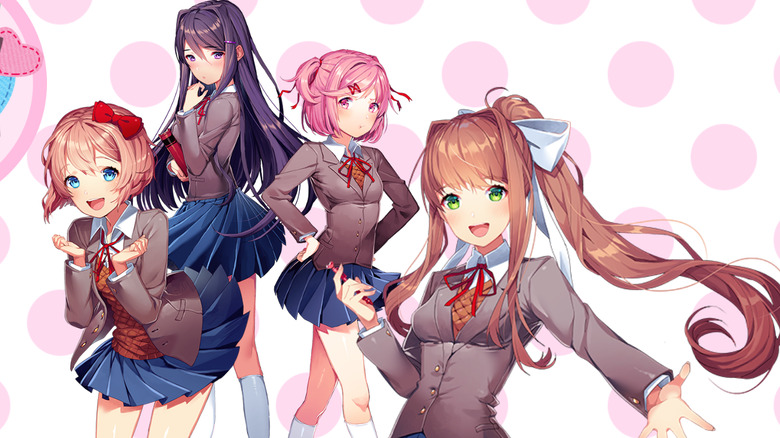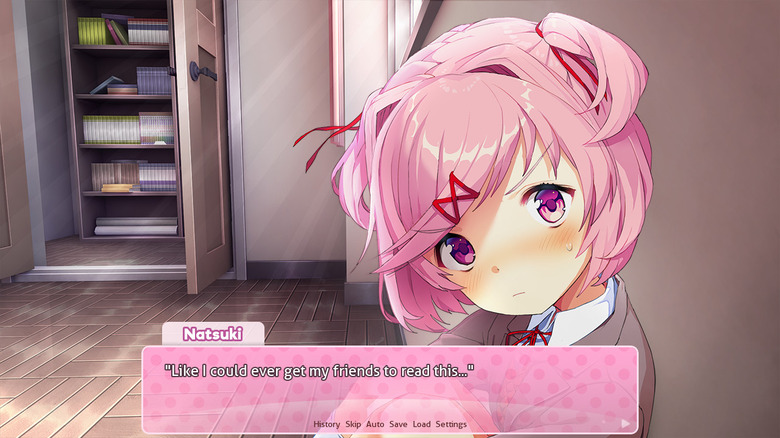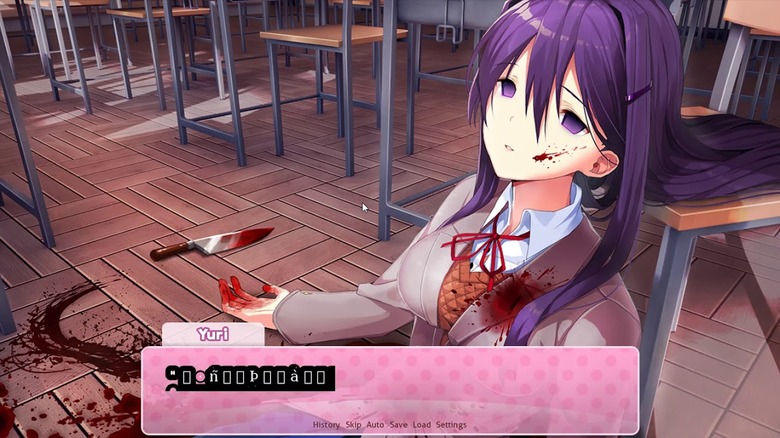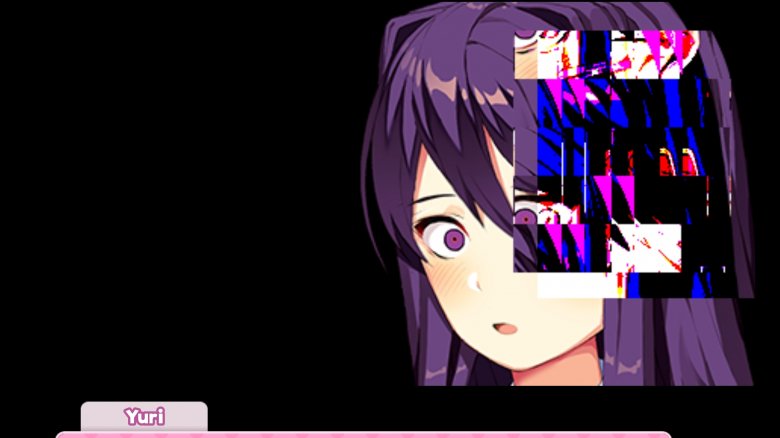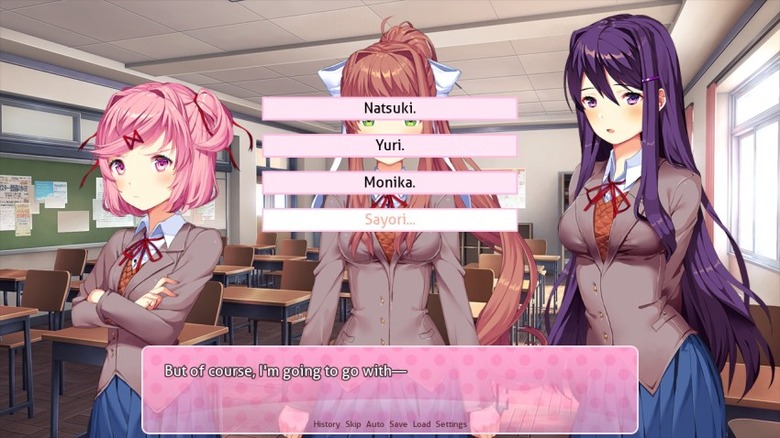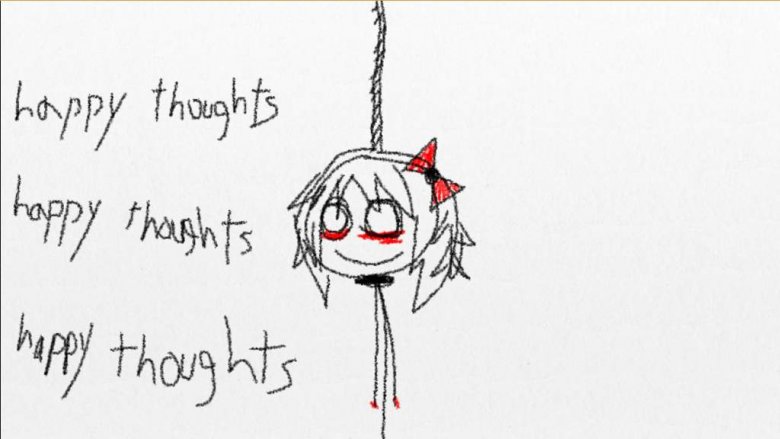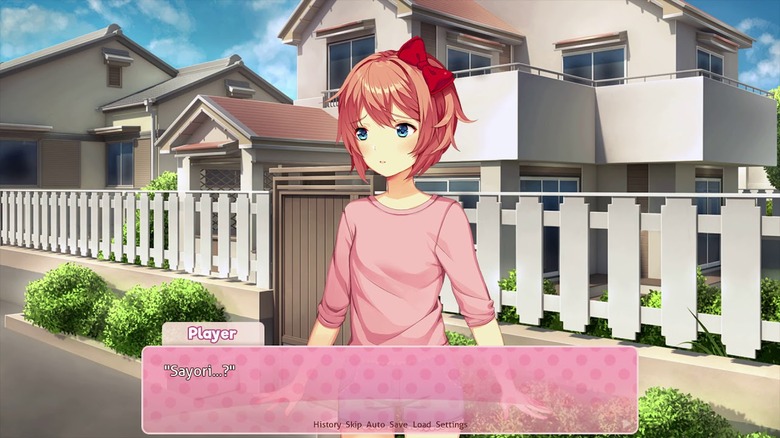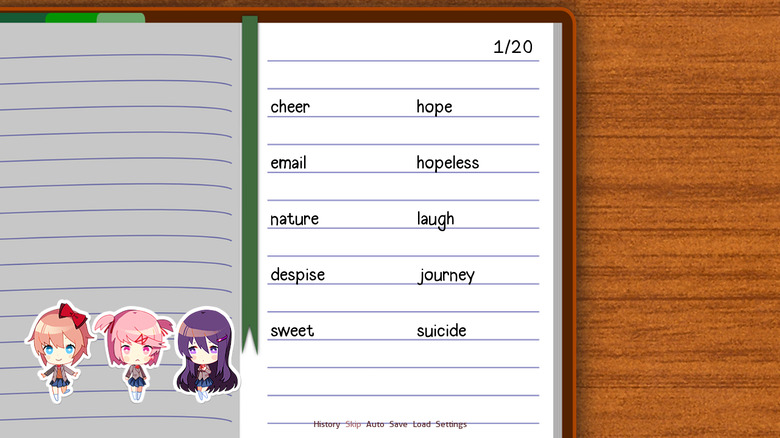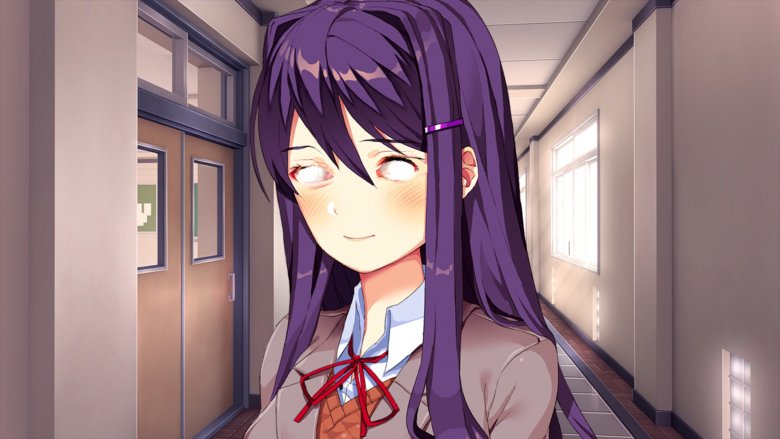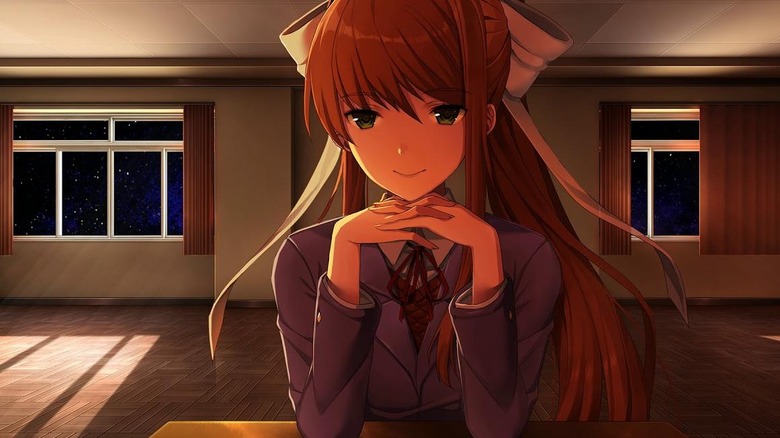The Best Horror Video Game Is Not What You Think
The last decade has produced some of the most horrifying experiences that gamers willingly throw themselves into: from AAA hits like Dead Space to indie darlings like Inside. The more mind-bending, spine-chilling, and grotesque the game, the better, and developers are more than happy to oblige in these twisted fantasies. After all, there's nothing more fun in a let's play than watching grown adults shriek like seven-year-olds as they round a corner into a jumpscare.
It would be easy to award the title of best horror game to a classic like Silent Hill. Konami wrote the book on producing all things spooky scary and games have followed suit since; mysterious locales, deformed and tortured creatures, protagonists desperately wending their way through puzzles and puddles of blood. But true terror happens outside of one's comfort zone. Gamers have been coddled by this formula, but every once in a while, a game breaks the mold and surprises the ever-loving snot out of us all.
The perfect storm of horror exists entirely outside of abandoned mental asylums, adrift space stations, and ominous mansions. The best horror game happens in your own backyard, on your own desktop.
We're talking about the heart-pounding horror that is the sugar-coated facade of Doki Doki Literature Club — a game that is way, way more than meets the eye.
False sense of security
A good horror game does not announce that it is a horror game. It whispers disconcerting things until you're fairly sure that something is not right. Doki Doki Literature Club gaslights gamers into a false sense of security because there is no way a game so cute and pink could be so scary, right?
Dead wrong. Doki Doki Literature Club is cleverly camouflaged as an entirely innocuous game. The cartoonish lettering and the flirtatious flounce of the anime girls who grace the game's cover image seem to promise nothing more than the same, played-out formula of every dating sim: the most strenuous thing the protagonist must do is figure out which of the four girls they want to romantically pursue. The girls themselves fall into the familiar tropes of the childhood friend, the blustering yandere, the shy type, and the more mature beauty.
"The Literature Club is full of cute girls! Will you write the way into their heart?" predictably reads the game's description on Steam, before taking an unexpected turn, "This game is not suitable for children or those who are easily disturbed."
What could be so disturbing about such an adorable game? As it turns out, a lot. Much of the punch behind Doki Doki Literature Club's power is the juxtaposition of the cutesy anime girls and the shocking events within the game. With pretty packaging, it's hard to discern the horror within, so when it rears its ugly head, the game is scarier than any cobweb-strewn basement.
A twist on an otherwise innocent genre … or is it?
The "doki doki" in Doki Doki Literature Club means "heart-pounding" in the sense of the way one's heart flutters when they think of their crush rather than when it's fit to burst out one's chest as they hide from a serial killer. The Japanese phrase is a call back to the slew of visual novels the game is inspired after, complete with beautiful anime girls that are inexplicably head over heels for a bland main character that players project themselves upon.
While Doki Doki Literature Club models itself off of a dating sim with its limited dialogue options and apparent focus on romance, the game is by no means the first of its kind to get doki doki in the terrifying sense. The 2002 game Higurashi: When They Cry is all dialogue and anime girls, too. The game at first appears to focus on the relationship between the main character and the game's girls until it takes a turn for the grotesque: crazed killings, disemboweling, and a mystery to solve all in the simple gameplay of a visual novel.
Doki Doki Literature Club masterfully marries horror and the storybook quality of a visual novel, but it is just one of many indie titles jumping on the terror trend. Ichi.io, the indie game publishing site, has approximately 313 titles that are horror-themed visual novels. Doki Doki Literature Club is just the best known, for good reason.
The game has made a name for itself by knowing yours
The thing that makes Doki Doki Literature Club so scary is in its self-awareness. The game is chillingly sentient in that it knows the player: their name, their save files, and whether or not they're streaming. Streamers are in for an especially sudden scare if Monika figures out that they are recording her.
The game breaks the fourth wall, getting seriously meta. The player is propelled into an unsettling reality when they are suddenly blinked back to the main menu, their save files deleted. Adding to the sense of unease, one of the lovely, smiling girls is gone from the start menu. She's gone from the game too, and anywhere she may have been mentioned is glitched out, apparently corrupted. So begins a steady descent into meta madness. After the unsettling events of the first playthrough, some very un-cute things happen, the game jumping forward and backward in time, erasing files and leaving others as horrific calling cards.
Monika, now internet-infamous, admits to having taken liberties with the game and the psyches of the other girls, taking out the competition one by one. She knows that she is in a game and she knows the player's real-world name.
You still get your jumpscares
If Doki Doki Literature Club is just a visual novel, it can't possibly have the same effect as games that have the player being chased by melty flesh monsters, right? Again, Doki Doki Literature Club supplies nothing but surprises and in some instances, jump scares.
It's these moments when the pastel veneer is suddenly and violently stripped away that has made the game a favorite with streamers and YouTubers. Abrupt moments when the meaningless conversations splice into an image of a wide-eyed, glitching version of a cute girl saying something like "Nobody would cry if she killed herself" have launched the game into the mainstream as a true-blue horror game.
The switch between innocence and corruption is so jarring that the lighthearted music often has no time to catch up to the bloodstained image on screen. Let's players leaning in to read the dialogue are forced back as they watch a formerly stiff and still character sprite jump into full-fledged animation as she stabs herself. Sprites jumping past the dialogue panel with blank, staring eyes and static crashing through headphones might not seem as scary as a decrepit animatronic screaming at the player, but after being lulled by seemingly dull dialogue into a false sense of security, the unexpected moment of what-the-heck is far more anxiety-inducing than expecting a psycho killer to find you in a dank hallway.
The real horror is the psychological burden
Doki Doki Literature Club is a psychological horror game. It messes with your head, and your gameplay. As with any visual novel, the player is forced to make decisions — read Natsuki's poem or Yuri's? — but these decisions have dire consequences that go far beyond hurt feelings. One wrong choice and there's suddenly blood and screen-tearing.
But there's not much choice other than to just continue your descent into madness. There's no inkling as to whether or not the game will return to normal, and there's no escape. In a game that is crafted from limited dialogue boxes and a small option box here and there, there isn't anywhere to run to. There's no respite even in exiting the game — the file sits there, ominous and collecting disturbing image and text files for the player to follow like breadcrumbs.
Should the player brave the horrors of the game, they sometimes don't even have the choice to make the right one. The game will move the player's cursor of its own accord, delete options, and twist time and space. Doki Doki Literature Club holds a virtual knife to the player's working throat and doesn't let up.
Creepypasta come to life
A little-known, fairly plain-looking game posted for free from an unknown developer, the legend of its twisted story spread by word of mouth, its imagery just the right amount of wrong: there is a good reason as to why Doki Doki Literature Club sounds like it is a creepypasta. At one point, its creator was writing them himself.
There's a precise formula to a good creepypasta. Since the days of Jeff the Killer and even Slenderman, the internet has been oversaturated with writer after writer trying to capture the same viral nature that placed these stories into infamy. Which is to say, that doesn't often work out. Doki Doki developer and creator Dan Salvato once posted on Tumblr the alleged confession of a 19-year-old murderer. This was fake, of course, but was just on the edge of believable. From then, Salvato wanted to make something bigger and better, and notably more unsettling, than a fabricated murder.
It took him two years to craft Doki Doki Literature Club, never once hinting at the game's true contents, but it was well worth the wait. The game spread like wildfire in the way a good scary story does and quickly met the staggering number of one million downloads, one million souls tortured by a seemingly normal game.
The horror hits home
Another aspect of Doki Doki Literature Club that makes it work as both a creepypasta and a phenomenally disturbing game is that despite how crazy it seems, the horror of the game is grounded in reality. No aliens, no T-virus, no Nazi-experiment-ghosts (seriously, we still don't fully understand Outlast), just the everyday terrors that prey on the mind.
The game gets points for taking a frank, arguably brutal, and unromanticized look at mental illness. Even adorable anime girls can get depressed, struggle with it, and then find happiness but not be wholly cured. For some — like panicked parents — the game loses points for basing its scares in violence and self-harm. Doki Doki Literature Club was implicated in the suicide of a teenager in the UK, and parents became concerned that the game's sweet camouflage could trick young children into exposing themselves to disturbing images of suicide and self-harm.
The game does come with the warning that it is not suitable for children or the easily disturbed, but its easy accessibility as a free-to-play game and viral nature has made parents nervous. However, developer Salvato embraces the uncomfortable.
"People become disturbed when forced to think about things they don't want to, or shown a reality that they always try to ignore," he said in an interview with Kotaku. Salvato has said that he was worried about his game being perceived as callous or cruel for its use of suicide, but was gratified when people who have suffered from depression or lost someone to suicide said otherwise.
Short and not-so-sweet
Despite the thousands of hours of Doki Doki gameplay uploaded to YouTube by YouTubers with comically shocked faces, the game is short, and not-so-sweet. A standard playthrough will take about four hours, but players are free to delve ever-deeper into the nightmare and stick around for up to seven hours to seek out all the gruesomeness the game offers. There is one possible ending that leaves players to stare at the saddest, most shocking image of the game for a full ten minutes before the final message of "Now everyone can be happy" appears.
The sheer brevity of Doki Doki Literature Club — even if it can seem plodding at times — is why the game deserves recognition as a top-notch horror game. Horror games that have defined the genre like Dead Space and The Evil Within overwhelm players with hours upon hours of anxiety. Scary as that might be, at some point, the player becomes acclimated to the terror. They anticipate being attacked or frightened or disturbed. For Doki Doki Literature Club, the gameplay gets weird, fast. There is no time for players to adjust themselves to the new reality of snapped necks and bloodstained poems.
You never know what you're going to get
If players aren't terrorized enough by their first playthrough, Doki Doki Literature Club still offers yet more spooky moments for players to stumble into. Some of game's weirder moments are common to all playthroughs: suicide, stabbing, and neck-snapping, along with the ominous, omnipresent nature of Monika. (Just Monika.)
However, there are rotten little Easter eggs strewn throughout the game, with varying chances that they appear. A few of these are totally randomized and are not for the faint of heart if a player is creeped out by eyes: eyes will drift off of the faces of characters, explode, and possibly stare out into the soul of a player from a whited out screen. Others depend on the player's actions in and outside of the game. Continuing to demonstrate the meta nature of Doki Doki, the game, namely Monika, will call you out for attempts at cheating.
The game's files are full of secrets that players have made various attempts to unlock as well. Checking the game's files after each act will sometimes yield bonus images, text that needs decoding, and "special" poems. The kind of sleuthing required to get all the gory goodness makes Doki Doki all the more immersive, and scary, when visuals unexpectedly distort and the game's music suddenly drops off in favor of heavy breathing.
Award-winning game
Doki Doki Literature Club could be called something of a sleeper hit, and it sure is a hit. The game was the star of the 2017 Halloween season, dominating thumbnails and Twitch streams. Despite its indie release, the game topped one million downloads in less than three months, a testament to the impact those four sweet anime faces had on the whole industry.
2017 was a remarkable year for games, with titles like The Legend of Zelda: Breath of the Wild, Super Mario Odyssey, and Wolfenstein 2: The New Colossus all vying Game of the Year recognition. But Doki Doki Literature Club, again with the power of being a genre-bending breath of fresh air among well-loved but well-worn formulas, managed to gain a significant following too. That dedicated fanbase flooded votes, winning Doki Doki Literature Club the popular vote for a slew of awards at IGN's People's Choice Awards. In fact, Doki Doki won in every category it was nominated in.
Dan Salvato was flabbergasted, especially at the fact that somehow Doki Doki had won for Best Adventure Game — something of an enigma among the well-deserved titles of Best PC Game, Best Story, and Most Innovative. He humbly qualified the success of the game as a result of its accessibility and that the game was at the peak of its popularity during awards season, thanking the eager and passionate fans that the game had amassed.

